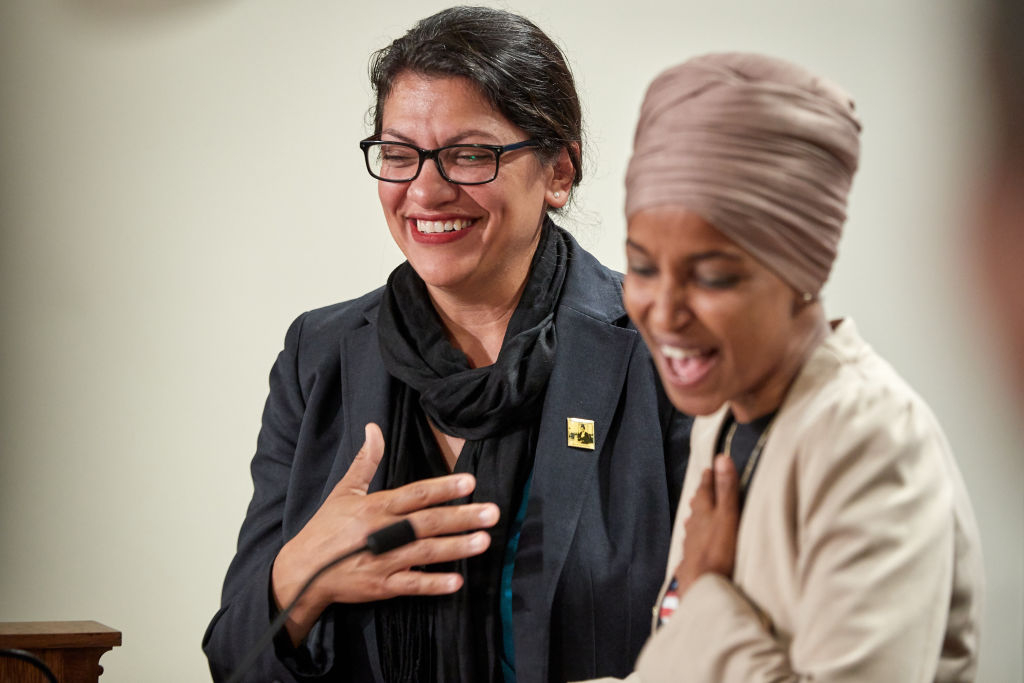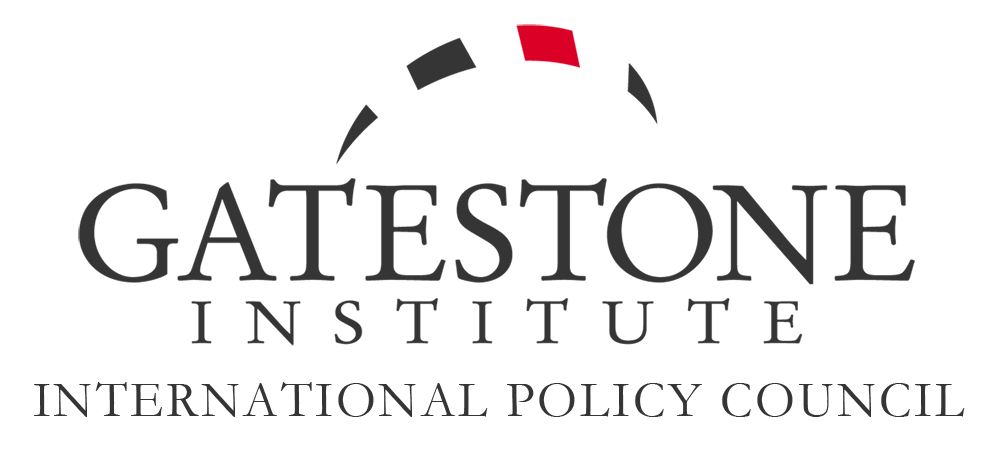In this mailing:
- Bassam Tawil: How a US Congresswoman Can Help Palestinians
- Lawrence A. Franklin: Al-Qaeda, ISIS, Afghanistan and an Opportunity for the West
by Bassam Tawil • August 21, 2019 at 5:00 am
While Congresswomen Rashida Tlaib is using the controversy surrounding her visit as an excuse to launch scathing attacks on Israel, Palestinians seem to be more worried about failed leaders in the West Bank and Gaza Strip. This concern is not something that Tlaib seems to share with Palestinians because for her the only wrong-doing is coming from Israel.
"Praising suicide bombers and pushing blood libel is not 'criticizing Israeli policy.'" — Charles Sykes, The Bulwark, August 19, 2019.
As a Congresswoman, Tlaib should have been worried that a US Embassy was forced to cancel an event to help Palestinians because of threats and calls for a boycott.
It would have been helpful had the Palestinian-American Congresswoman made an effort to persuade Palestinian Authority officials to resume their relations with the US administration and explore ways of boosting the Palestinian economy and improving living conditions in the West Bank and Gaza Strip. As a Congresswoman, she should be working to build, and not destroy, bridges between her people and the US. Her fierce attacks on Israel and the US administration, however, embolden Palestinian hardliners and fuel hate against Israelis and Americans.
If Tlaib really cared about the Palestinians, she should be campaigning against the PA and Hamas leaders engaged in a power struggle over money and power. Moreover, she should be calling for reforms and democracy under the PA and Hamas. The least she could do is demand an end to human rights violations by the PA and Hamas or demand that they hold long overdue presidential and parliamentary elections. She could also demand an end to crackdown on freedom of speech under the PA and Hamas.

As a Palestinian-American Congresswoman, Rashida Tlaib should be working to build, and not destroy, bridges between her people and the US. Her fierce attacks on Israel and the US administration, however, embolden Palestinian hardliners and fuel hate against Israelis and Americans. (Photo by Christ Chavez/Getty Images)
Congresswomen Rashida Tlaib is apparently upset because she was not able to agitate against Israel during a proposed visit to her grandmother there.
"I would like to request admittance to Israel," she had written, "in order to visit my relatives, and specifically my grandmother, who is in her 90s and lives in Beit Ur al-Fouqa. This could be my last opportunity to see her. I will respect any restrictions and will not promote boycotts against Israel during my visit. Thank you, Rashida Tlaib."
When her letter was leaked to the media, however, Tlaib quickly backtracked:
"Visiting my grandmother under these oppressive conditions meant to humiliate me would break my grandmother's heart."
by Lawrence A. Franklin • August 21, 2019 at 4:00 am
In the short term, al-Qaeda evidently wants to pressure the United States to withdraw from direct involvement in the Middle East. ISIS, on the other hand, wants to cleanse the region's Arab regimes of secular dictatorships, corrupt ruling elites and insufficiently devout Muslim intelligentsia.
There is, however, a serious complication. The Taliban-al-Qaeda coalition is now being challenged by increasingly strong ISIS forces in several Afghan provinces. The United Nations recently estimated that ISIS still have roughly $300 million at their disposal. Moreover, some "disaffected" or hardline Taliban fighters opposed to ongoing negotiations with the U.S. are defecting to ISIS.
The West should take no pleasure in the global competition between al-Qaeda and ISIS. It is a competition that incentivizes each terrorist network to upgrade its recruitment appeal for the next generation of jihadists.
In its effort to sustain a pro-Western regime in Afghanistan, the United States might instead take advantage of an opportunity already in place. In an area of such unrest, and where it is still unclear what the word of those making promises is worth, it might be wise to keep a modest footprint rather than withdraw all troops. To abandon the area totally, as President Obama abandoned Syria and Iraq, and then find it overrun with terrorist groups, would be, as one saw, a catastrophic mistake.... Although admittedly less than ideal, it still be might be far less costly in life and treasure, as with the Middle East, to safeguard the area and gather intelligence, rather than to leave and then have to go back. It is an opportunity that would be foolhardy to give up.

In its effort to sustain a pro-Western regime in Afghanistan, the United States might instead take advantage of an opportunity already in place... it still be might be far less costly in life and treasure to safeguard the area and gather intelligence, rather than to leave and then have to go back. Pictured: U.S. soldiers on patrol near Kandahar, Afghanistan in 2014. (Photo by Scott Olson/Getty Images)
While the world's two most prominent and competing jihadist networks, al-Qaeda and the Islamic State (ISIS), share the ultimate objective of establishing a global Islamic caliphate and ushering in the apocalyptic age of the Mahdi. Their intermediate goal seems to be replacing the liberal nation-state system with a worldwide Muslim Ummah. Their immediate aims are different.
In the short term, Al-Qaeda evidently wants to pressure the United States to withdraw from direct involvement in the Middle East. ISIS, on the other hand, wants to cleanse the region's Arab regimes of secular dictatorships, corrupt ruling elites and insufficiently devout Muslim intelligentsia.
Al-Qaeda and ISIS also differ in strategy, tactics, relations with fellow Muslims, treatment of non-Muslims and methods of proselytization.
by Judith Bergman • August 20, 2019 at 5:00 am
How does a society deal with religious institutions that profess values which are the very opposite of the value system of the Western society in which they live?
"When I was in high school, there were around 50,000 people with a non-Western background in Denmark. Today, there are almost half a million. In one generation, our country has changed". — Lars Løkke Rasmussen, then prime minister of Denmark, January 1, 2019.
The Integration Barometer -- which measures the degree of assimilation in the municipality among young people with a non-Western background -- showed that almost one third of 18-29 year olds (31%) believe that "religious and cultural laws must be adhered to, even though they may be contrary to [Danish] law". The issue, then, is whether these young people believe that Islamic sharia law should take precedence over Danish law.... In addition, the number of youths who view democracy in a positive light has fallen from 86% in 2016 to 79% in 2018.
It recently came to light... that a committee under the government's Ministry of Church Affairs, which is responsible for formally approving mosques in Denmark, has been handing out approvals for them without knowing "whether they [the mosques] were ruled from abroad, whether women's rights were suppressed, or there were other problematic conditions". Formal approval of a mosque means that the mosque becomes eligible for tax benefits and is permitted to bring foreign preachers to Denmark on a special visa.
When the association behind the mosque [asked]... to be approved as a religious community, it had in its statutes a provision saying it operated under the supervision of Iran's 'Supreme Leader', Ayatollah Ali Khamenei. At first, this news was a matter of concern for the Ministry of Church Affairs, but then Ahlul Bait simply rewrote its statutes and the ministry gave its approval.

In his New Year's speech on January 1, 2019, Denmark's then prime minister, Lars Løkke Rasmussen, mentioned that religious parallel societies constitute a problem and that immigrants need to learn to "put secular laws over religious ones". (Photo by Rune Hellestad/Getty Images)
Earlier this year, in his New Year's speech, Denmark's prime minister at the time, Lars Løkke Rasmussen, mentioned that religious parallel societies constitute a problem and that immigrants need to learn to "put secular laws over religious ones".
What, however, if, in the community involved, there seems no desire to do that?
"When I was in high school", Rasmussen continued "there were around 50,000 people with a non-Western background in Denmark. Today, there are almost half a million. In one generation, our country has changed".
by Andrew Ash • August 20, 2019 at 4:00 am
Rashida Tlaib had asked to go to "Palestine," which so far does not exist, on a trip arranged and co-sponsored by a Palestinian not-for-profit organization, Miftah, headed by longtime Israel-antagonist, Hanan Ashrawi. The group is described by Becket Adams in the Washington Examiner as "an exceptionally anti-Semitic group that praises Palestinian terrorists and claims Jews used the blood of Christians in the Jewish Passover. The organization also publishes Neo-Nazis and calls for the destruction of Israel." Miftah has also called female suicide bombers heroes.
"I have never felt more Palestinian, than I have felt in Congress", she defiantly declared to the Michigan Coalition For Human Rights in April 2019. That does seem a bit rich, coming from the same woman who has taken succour in tweeting that Senators who supported a pro-Israel bill "forget what country they represent."
She simply seems uninterested in any type of protest that does not involve either noisy eviction or arrest, or in which she cannot get attention or be regarded as a victim. It is hard not to wonder what she is doing for her constituents. Is the wish to bash Israel actually what keeps the good voters of Michigan awake at night? And is anti-Semitism now the accepted new face of the Democrat party?
"I have to tell you, we have to understand first, what is the BDS [boycott, divestment and sanctions] movement? It's an anti-Semitic, basically genocidal movement that wants to see the end of Israel. So make no mistake, these are not moderates coming to visit Israel. Israel per its 2017 law has a right to prohibit activists, especially those who want to see it wiped off the map, from coming in." – M. Zuhdi Jasser, Founder and President of the American Islamic Forum for Democracy.

US Congresswoman Rashida Tlaib (left) had asked to go to "Palestine," which so far does not exist, on a trip arranged and co-sponsored by a Palestinian not-for-profit organization, Miftah, a group described in the Washington Examiner as "an exceptionally anti-Semitic group that praises Palestinian terrorists and claims Jews used the blood of Christians in the Jewish Passover." (Photo by Adam Bettcher/Getty Images)
US Congresswoman Rashida Tlaib (D- Michigan) decided to pull the plug on the trip to Israel she was due to make, originally with her fellow "Squad" member, Ilhan Omar, after they both were invited on an official congressional trip but declined.
Although both Tlaib, and the equally outspoken Ms Omar, had initially been refused entry because of their radical views promoting the obliteration of Israel by boycotting it, being boycotted back was not part of the plan, it would appear. Tlaib was finally granted permission on "humanitarian grounds", after an emotive plea to Israel's Interior Minister Aryeh Deri, in which she set out her reasons for wanting to visit her Palestinian grandmother in the West Bank.
The newly-minted congresswoman then back-tracked and has now decided to cancel the trip altogether.
|
|
|





No comments:
Post a Comment